
We wandered along the banks of the great Snake River, peering over canyon rims as the water ran teal to deep indigo in a shadowy turn, and out of sight. Behind us a gravel road lined with sage climbs toward a sun-faded November sky, and there you’ll find their gate. Greeted by a great white Pyrenees, a safety inspection will ensue before he escorts you to a house encircled in trees. To your right, a workshop with an American flag pinned to its side marks the beginning of an ambitious garden of herbs, flowers, and vegetables. To the left, a pond full of geese rests beneath a weeping willow tree.
Two hunting pups and a Weiner dog beat Jillian Lukiwski and her husband Robert Krapfel out their front door to greet you, handshakes and hugs to ensure you know how welcome you are to stay. Their little piece of productive paradise has been a long time coming; as they’ve lived other lives all over the globe, but the one their building now feels the most like home.

Jillian is a Canadian, turned Idahoan, who makes a living and a life as a silversmith, photographer, writer, and farmer; all while being a fire wife to her U.S.F.S Smokejumper husband, Robbie.
Alaska, Washington, Arizona, Montana, and Idaho all bear the fruits of their handiwork, breadcrumbs of beauty and restoration lingering long after they leave. Jillian and Robbie are a team, they’re caretakers, and creators, goal-chasers, slow-it-down-ers, and leave-it-better-than-you-found-its-ers.
“I wanted to fight fire from a young age, after reading “Young Men and Fire,” said Robbie, who grew up in Northern California. “I think there’s an attraction for a lot of guys to want to put themselves up against warfare or the elements. By the time I was 19, I was on an engine crew in Montana,” explained Robbie.
After a few years, Robbie left fire to finish school, and travel; traveling is what brought him to his wife Jillian where they met and eloped. Robbie got his degree in environmental science, joined the U.S. Fish & Wildlife Department as a fish biologist and the newlyweds took a job running a remote grow facility for endangered fish in Arizona.

“That was a young person's dream job,” said Robbie. “They were like here's this place which hasn't been successful. Just figure it out, make it work. You have tools, heavy equipment, and a budget. It was a great experience where I could learn to use equipment, learn how to problem-solve everything on my own, which set me up for success later in life.”
“I've always been good at nurturing, raising things, growing things. All they needed at that facility was somebody who would actually go out to check on the fish. Somebody who would notice if the fish were sick and do something about it.”
“You have a specific set of talents that made that program successful. Not just anybody could have done it,” Jillian interjected. “The project had millions of dollars poured into it for quite a few years. They had never successfully raised any of these endangered fish for microchipping and being released back into the Colorado River system. Rob showed up and within a year he successfully did like 40,000. He immediately turned the whole program around and suddenly it was successful because the right person was there.”
When they arrived in Arizona, the compound where they lived and worked consisted of two single-wide trailers, a gravel pit, and huge outdoor ponds encircled with a chain-link fence. “By the time we left, we had planted rows of beautiful Cottonwood trees, Palm trees, Mesquite trees, put in a garden, and built decks. I will say that that is always a strength of ours wherever we live, we treat the place like we're going to be there forever. We'd buy the perennials and we put them in, we plant the trees, and we always manage to leave it way more beautiful and functional than when we found it,” said Jillian.
While the program was humming along successfully, there was something in the back of Robbie’s mind that he just couldn’t shake. “I loved that job and was doing quite well in it. But it bothered me that I hadn’t met my goal to be a smokejumper. So I quit to get back into fire,” explained Robbie. Few people understood his desire to leave his career as a fish biologist, taking a significant pay cut to work a much more dangerous and labor-intensive position in the fire service as an “old man rookie.”
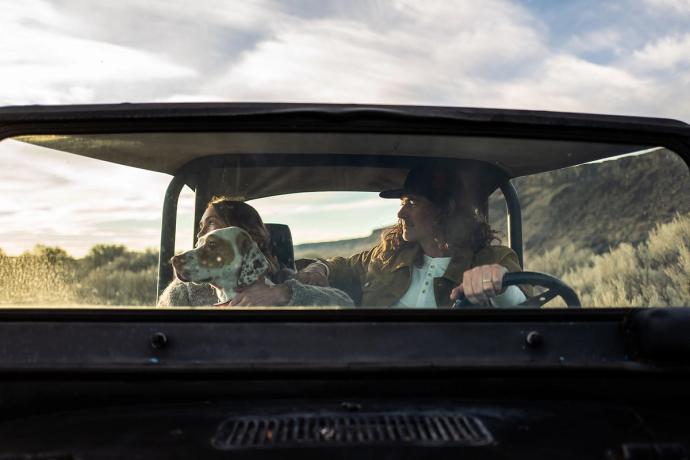
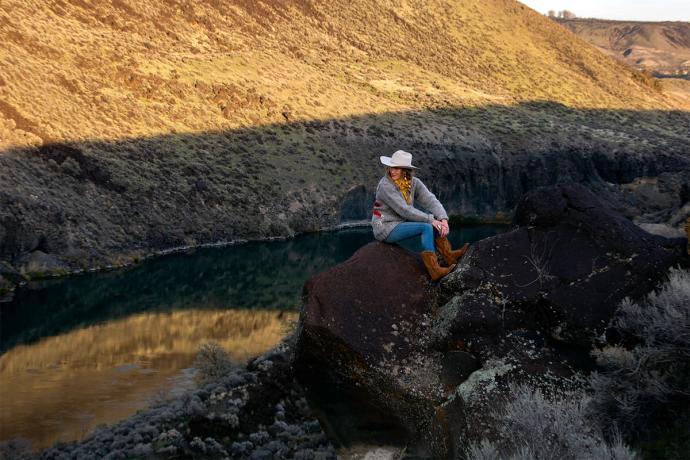
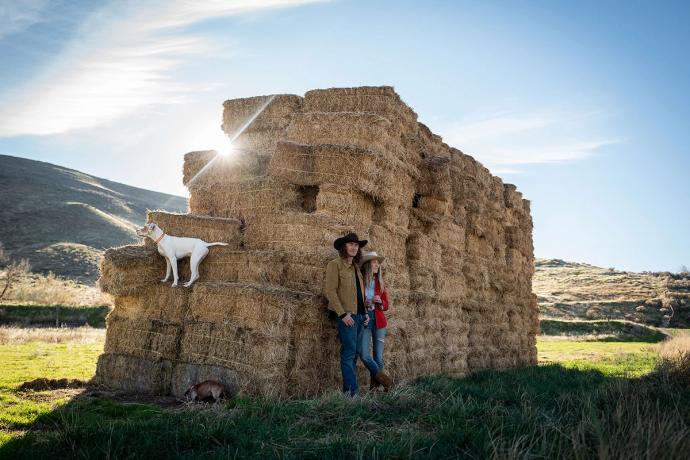
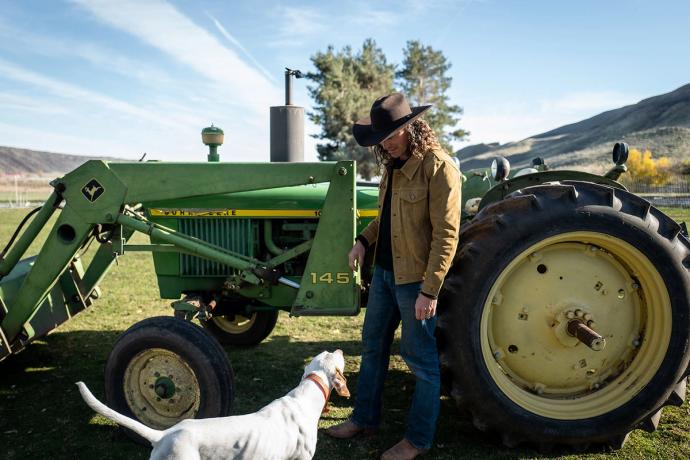
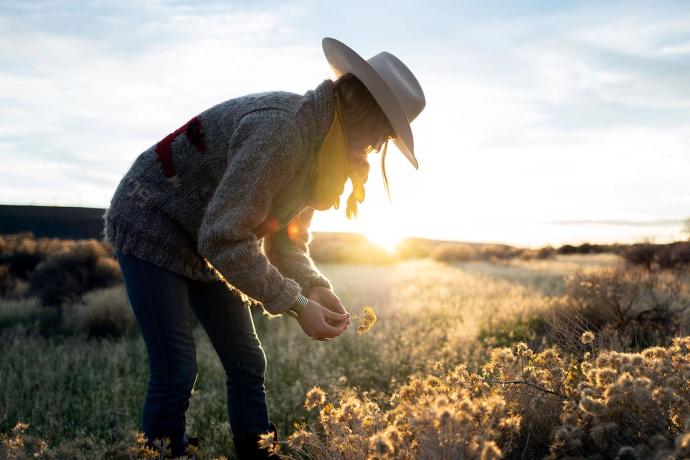
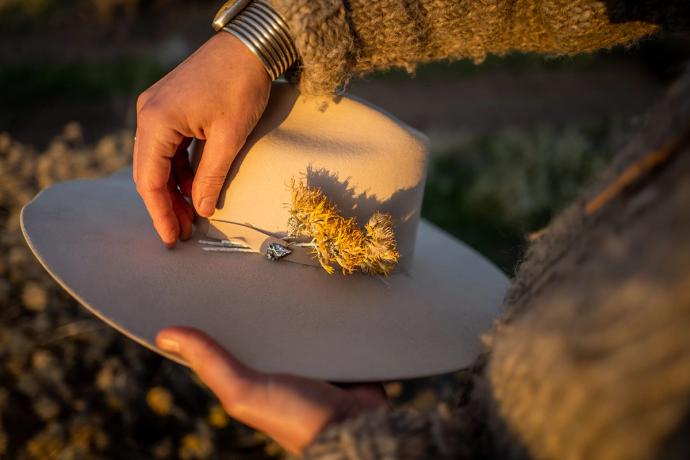
“Smokejumpers, and I'm not saying there's any validity to this, are viewed as that top echelon of wildland firefighters. I wanted to do a lot of things with my life, but always be in that niche of putting myself out in the elements and to be the best within a certain field.” Robbie became a Smokejumper, jumping out of planes and parachuting into remote, burning landscapes to control some of our country’s most intense forest fires that would otherwise lay waste to our public lands. A career in which he has excelled for the last 15 years. He’s been stationed in nine permanent bases and dozens of spike bases over the years; but firefighting wasn’t his only iron in the fire.
“Farming was always part of the plan for both of us,” Robbie said. “I’ve always felt that I needed five lives because there are so many things I want to do. From the very beginning, we talked about wanting land and maybe even romanticized the idea of self-sufficiency a bit.”
They discussed buying land in Alaska when they lived there, and later of buying Jillian’s grandparents' wheat farm in Canada but it wasn’t until they found the Snake River steppe while chukar hunting that they bid on a piece of ground to call their own.
“I don't think we could have moved to Canada and really pursued our life dreams the way we've been able to here,” Jillian said. “Being in America has allowed us to really pursue multiple dreams at the same time. It's something that's really precious about this country. Most people go to college, get a degree, pick a career and that's how your life goes until you retire at 65. We've been able to reinvent ourselves multiple times.”

Their farm truly is a river canyon oasis; seventy trees standing sentry over the geese, ducks, chickens, heritage turkeys, Kunekune pigs, horses, dogs, cats; and a hayfield, orchard, garden, and garlic crop to sustain them all. When the weight of the farm wears them down, they walk out their front gate to explore millions of acres of public land that follows the winding Snake River. And for the last six years, in the off-season, Robbie has been developing his garlic crop.
“It’s been a long-time coming, and it's not that I love garlic more than other things. Garlic came to light when we looked into what we could do with what we have, which is a small irrigated homestead.” And they did what they’ve always done, according to Robbie, start small and build slowly, “That's always been our theme.”
Robbie was in a prime location to begin his garlic crop, and it wasn’t only the volcanic soil or the water access that made it so. Idaho and Eastern Oregon house the largest garlic industries in the U.S. and to get started growing it yourself, you have to buy your garlic from someone in the “quarantine area,” where it has been inspected by the Department of Agriculture. While the barrier to entry is expensive and rigorous testing of your harvest, you wind up with the highest certification of clean garlic in the U.S. If you’re buying seed garlic, Idaho is where you want to source it, and with a limited number of growers, it’s a hot commodity.
“That was a roadblock, but also an opportunity. It makes a niche crop, even more, niche,” explained Robbie. “We have a half-acre out there, which for most farming would be nothing. But for garlic an acre is significant.”
“And we picked something that could be supported by the empire that I've already built,” added Jillian. This year, for the first time they offered Robbie’s garlic to the greater world through Jillian’s online shop, The Noisy Plume. Their harvest sold out in a day. “A lot of that support is coming from the support that I already had as a jeweler and a photographer which is a great blessing.”

Jillian and Robbie are embarking on what many people across the country are recognizing as a necessary shift in our national food system. “There's a lot of people doing really good jobs with small diversified, CSA style community-supported farming. I view that as food security, people are starting to realize that you are what you eat.” As small farmers are increasingly being pushed out of land acquisition, and fewer acres are dedicated to farming, CSA shares are bound to be maxed out in the coming years. “ I think that's at the heart of big shifts in food systems in this country. We don't talk about it enough as a culture, because we all got used to cheap groceries in the grocery store and the convenience of that. But people are starting to see the breakdown of these systems that we take for granted because they're invisible and the food keeps showing up - until it doesn’t.”
Jillian and Robbie are a well-oiled machine, he puts out fires and she smolders and solders stunningly designed jewelry when she isn’t working as a freelance photographer and writer. Together they plant, steward, and harvest a supplemental income on the farm. As they feel themselves strain at the seams of what they can produce on 15 acres, they are getting creative in how they diversify their labor; considering teaching classes, and offering workshops in skills such as animal processing, garlic braiding, etc.
The half-acre dedicated to garlic is outgrowing their abilities to manage between the two of them, and growing pains are demanding a reprieve in some other area of their lives. But that was their intention all along, for garlic to be Robbie’s exit strategy from Smokejumping.
“Garlic is the thing, which we really hope we're making more income off of but the greatest challenge with garlic is labor. So labor-intensive,” said Robbie who put sixteen thousand cloves in the ground this fall by hand.
While Jillian’s stunning photographs of life on their farm send the masses clambering for a farm of their own. She never shies away from the truth about farming, big or small, it’s hard work. Living for the continual growth and health of plants and animals and soil isn’t for the faint of heart.
“I reach a point in the summer where I'm just maxed out. I basically wake up and triage my life. What's most critical? What is urgent and necessary? I kind of approach all of life like this, but especially during the fire season. I just do what I can,” Jillian explains what a struggle this has been for her, and how it has taken years to reconcile with the fact that she has limitations, she is flesh and bone and soul after all.

For an artist living in a perpetual state of triage for most of the year, it’s a marvel in and of itself that she is able to create and create well.
“I don't wake up and think to myself, what things will I do for myself today that will juice up my creative power. For me, it's more about how am I going to manage my life today to make sure that I fit in the things that I have to do to stay healthy,” She said. “ I get a good sleep, which ensures that I have a good day tomorrow and I have the energy levels to get everything done in the morning so that I can be in my studio by noon and then knock off at five to fit in a run before I make dinner. Then I like to read a book for an hour in the evening before I go to bed.”
For Jillian, the most generous thing she can do for herself every day is cook two “really burly meals” from scratch, get fresh air, sunshine, and time with her horses to maintain a baseline quality of life. “I live here to have horses. I live in the middle of nowhere to enjoy the beauty of the land and to enjoy the river, to enjoy running through the landscape. I must do that every day. Otherwise, there's no point to living here and no point to any of this.”
In a crowd, she’s gregarious and full of life, but as an introvert, she thrives on being alone.
“She could be in her studio making stuff, and she's on fire, she's loving life,” adds Robbie with a laugh, “The admin stuff is what drives her mad.”
“If I have to stare at a screen all day I feel half dead. The problem is I can never really get on top of it. I don't want to hire somebody to answer emails because I actually simultaneously really enjoy interacting with my support base. They took time to sit down and send me a note that just, just for the sake of encouraging me, and I value their time,” Jillian said, rotating the problem through her mind as she explained the gift and strain of loyal supporters.
“I care about them. They're feeding me. They're paying our mortgage for us there. They bought Robert's tractor this spring, they eat our garlic, it's so meaningful to me that there are people out there that are invested in what we’re offering. Some of them have been following me for 15 years. They've been reading my blogs for 15 years. I don’t feel even really worthy of it.”

While Jillian’s customer base is online, she feels the weight of a culture that prioritizes constant communication, instant replies, and Amazon Prime.
“Being in constant communication isn't sustainable. I want to be able to work until the day I die and I can't allow myself to just be used up by people. We all need to chill about response times. We used to write letters and then they were put in bags, put on ships, taken across the ocean, then delivered to a post office where people had to then go to the post office and get their mail. It took weeks and months to communicate.”
While she’s received a fair amount of hate mail from people who are inordinately enraged by her slow response rate, she’s stood her ground and reaped the benefits of not being swept along with the current trends. “You can train people with regards to what your response rate is with things. Once they figure that out, they tend to be okay with it. Sometimes it takes me one minute to answer an email. Sometimes it takes me one month. Things take as long as they take.”
While Jillian may be slow to respond, she’s far from out-of-touch. She’s insatiably well-read and consumes a record number of podcasts in her studio as well. “I read this book by Dave Ramsey about leadership and it talks about people who are successful business-wise. One of the greatest factors in successful people can determine what is urgent and necessary. Most people spend a lot of time on what is urgent, but not necessary. They say oh my gosh, I have a text. I have to respond right now. What’s not necessarily urgent suddenly becomes critical. Versus successful people, they can identify what is actually urgent, what is actually necessary, and not get sidetracked with all that other stuff. I think that’s incredibly interesting.”
According to Robbie, her success is rooted, more than anything, in consistency. “One most important thing for success, which is very hard to find, is sustained intensity over time. Jillian has done an amazing job with that over the last 15 years. Nine out of 10 people can get super excited about something for a very short period. But to be intensely focused, not just for two days, not just two weeks, but year after year — those are the businesses that thrive. And that’s something we’ve applied to everything we’ve put our hand to.”
Starting small, and slow, consistent growth is their recipe for success on the sage steppe of the Snake River plateau.
